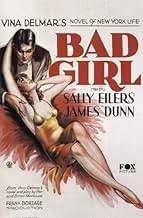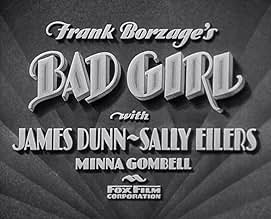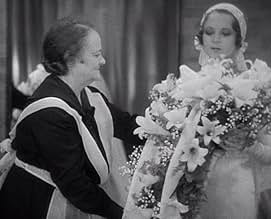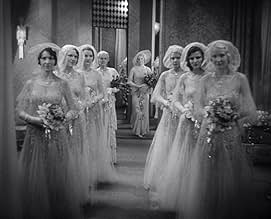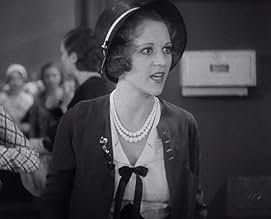IMDb रेटिंग
6.4/10
1.8 हज़ार
आपकी रेटिंग
अपनी भाषा में प्लॉट जोड़ेंTwo adolescents fall in love and are wed, but misunderstandings born from a lack of trust and communication haunt their marriage.Two adolescents fall in love and are wed, but misunderstandings born from a lack of trust and communication haunt their marriage.Two adolescents fall in love and are wed, but misunderstandings born from a lack of trust and communication haunt their marriage.
- 2 ऑस्कर जीते
- 6 जीत और कुल 1 नामांकन
Frank Austin
- Upstairs Tenement Neighbor
- (बिना क्रेडिट के)
Irving Bacon
- Expectant Father
- (बिना क्रेडिट के)
William Bailey
- Expectant Father of Twins
- (बिना क्रेडिट के)
Sue Borzage
- Unknown
- (बिना क्रेडिट के)
Jesse De Vorska
- Expectant Father
- (बिना क्रेडिट के)
Bud Eilers
- Man Outside Candy Shop
- (बिना क्रेडिट के)
Edward Hearn
- Male Nurse
- (बिना क्रेडिट के)
Aggie Herring
- Seamstress
- (बिना क्रेडिट के)
Claude King
- Dr. Burgess
- (बिना क्रेडिट के)
Louis Natheaux
- Mr. Thompson
- (बिना क्रेडिट के)
Sarah Padden
- Mrs. Gardner
- (बिना क्रेडिट के)
Lorin Raker
- Male Nurse
- (बिना क्रेडिट के)
फ़ीचर्ड समीक्षाएं
This is a beautifully made, poignant drama about a young working-class couple starting their life together in the tenements of 1930s New York. This couple is incredibly normal and that's what makes this film so watchable. They're not gangsters, prostitutes, criminals, lawyers, or society girls down on their luck, they are just an ordinary couple without anything making them different to anyone else. What makes this so enthralling is therefore its story and specifically the storytelling.
The world these people live in is perfectly encapsulated with a scene early on when a neighbour dies on one floor of their tenement and a baby is born on another. Our hero sadly concludes: "Born on the second story... he'll probably die on the fifth. All his life, just to climb three flights of stairs." This however is a positive story, it shows that although The Depression was of course a struggle, even living in a one-room-apartment people survived, they went to work, had fun, got married, started families and found happiness. It was just life and that's what this picture is about even though in this case the couple aren't sure they're ideal for each other, aren't sure what they want, aren't sure that the other one doesn't love them and that makes us uneasy as to whether they will stay together. It's so well presented that very quickly we feel we know these people so are hoping desperately that they will make a go of it and that everything works out for them.
Inasmuch that it's about ordinary people, this is somewhat reminiscent of 1932's VIRTUE but the characters and the story and even the acting in this feel more natural and modern. It is perhaps more like the Kitchen Sink Dramas of the 50s and 60s such as LOOK BACK IN ANGER but set in America.
Why is it called "Bad Girl" and why has it got such a salacious poster? Obviously to get people to flock to the cinema and obviously to get people like me nearly a century later to watch it! Fox Films however knew that to avoid riots in their theatres when the customers realised the extend of the false advertising, they had to provide a genuinely top rate entertainment and that's exactly what they did. There is no "bad girl" in this film, that was the name of the book on which this was based but even in the book "bad girl" is just an insult which is thrown unjustly around, a term which our protagonist doesn't want to get branded with. Although this was made in what's referred to as "the pre-code era" the PCA made very sure that with this picture, the Hays Code was very heavily enforced. The eyes of the nation were on them because Vina Delmar's book had caused such an outcry, it was banned in Boston and was cited as containing: downright and unforgivable nastiness. Any suggestions or even hints that pre-marital sex was something which actually existed was heavily censored. The long process of consultation with the PCA lasted so long that Fox Films considered abandoning this entire project but eventually Miss Delmar's novel was considered suitably sanitised. We obviously can't ever know how a film of the original story would have been but even so, the changes certainly haven't destroyed the theme or spirit of the story. Possibly the challenges they posed have made a more interesting movie since Borzage has had to compensate for the lack of explicit content, language and sex with a visual flair unique to him.
The poster by the way does not seem remotely connected in any way with this film - it's good though isn't it!
The world these people live in is perfectly encapsulated with a scene early on when a neighbour dies on one floor of their tenement and a baby is born on another. Our hero sadly concludes: "Born on the second story... he'll probably die on the fifth. All his life, just to climb three flights of stairs." This however is a positive story, it shows that although The Depression was of course a struggle, even living in a one-room-apartment people survived, they went to work, had fun, got married, started families and found happiness. It was just life and that's what this picture is about even though in this case the couple aren't sure they're ideal for each other, aren't sure what they want, aren't sure that the other one doesn't love them and that makes us uneasy as to whether they will stay together. It's so well presented that very quickly we feel we know these people so are hoping desperately that they will make a go of it and that everything works out for them.
Inasmuch that it's about ordinary people, this is somewhat reminiscent of 1932's VIRTUE but the characters and the story and even the acting in this feel more natural and modern. It is perhaps more like the Kitchen Sink Dramas of the 50s and 60s such as LOOK BACK IN ANGER but set in America.
Why is it called "Bad Girl" and why has it got such a salacious poster? Obviously to get people to flock to the cinema and obviously to get people like me nearly a century later to watch it! Fox Films however knew that to avoid riots in their theatres when the customers realised the extend of the false advertising, they had to provide a genuinely top rate entertainment and that's exactly what they did. There is no "bad girl" in this film, that was the name of the book on which this was based but even in the book "bad girl" is just an insult which is thrown unjustly around, a term which our protagonist doesn't want to get branded with. Although this was made in what's referred to as "the pre-code era" the PCA made very sure that with this picture, the Hays Code was very heavily enforced. The eyes of the nation were on them because Vina Delmar's book had caused such an outcry, it was banned in Boston and was cited as containing: downright and unforgivable nastiness. Any suggestions or even hints that pre-marital sex was something which actually existed was heavily censored. The long process of consultation with the PCA lasted so long that Fox Films considered abandoning this entire project but eventually Miss Delmar's novel was considered suitably sanitised. We obviously can't ever know how a film of the original story would have been but even so, the changes certainly haven't destroyed the theme or spirit of the story. Possibly the challenges they posed have made a more interesting movie since Borzage has had to compensate for the lack of explicit content, language and sex with a visual flair unique to him.
The poster by the way does not seem remotely connected in any way with this film - it's good though isn't it!
A wildly uneven film that seems as confused as its marketing. The pre-Code era was known for salacious titles and advertisement, but I don't think I've ever seen a film more at odds with its poster. I'm not kidding, these are the words underneath the poster of the main character (Sally Eilers) leaning back with her ukulele:
EVERYBODY KNOWS THIS GIRL There's one in every town Tumult in her heart. She wanted things. Clothes. Boy friends. Fun. Gayety. Kisses. * Red-lipped shop girl in sleazy dress, Aching with suppressed emotions ... dance halls ... excursion steamers ... chop suey palaces ... Coney Island ... clinging farewells ... then back to the hall bedroom. * Drama of girls ... who love to live. Laughter of girls ... who live to love. * It's romance of the working girl ... today ... your most dependable patron.
In the actual film, nothing could be further from the truth. Eilers' character is not loose, flirtatious, or even pushing on the boundaries of the role women were assigned to. We see a lot of bad male behavior though, e.g. men coming on to her (leading her to remark to her friends that all of them have just one thing on their minds), a controlling brother who hits her for coming home late (alluded to, not shown), and even the guy she's attracted to (James Dunn) doling out insults and mansplaining things. When the two marry on a whim because she fears facing her brother after coming home at 4 am (though not having had sex), he also tells her that no wife of his will be getting a job.
The best part of the film is the support she gets from her friend (Minna Gombell), a tough talking woman who stands up for her. She literally flicks her husband's chin upwards while fixing his tie, and the two part with this exchange: "Bye, Grouch" / "So long, Dizzy."
The film providing a window into the conditions women faced and the bond between friends is when it's at its best, but it's less successful afterwards. At its center this is a relationship picture, with the married couple dealing with tight finances, and miscommunicating when she gets pregnant (they both think the other doesn't want a baby). It got quite tiresome over the last half hour for me. Dunn has a weepy scene where his acting leaves a lot to be desired, then improbably offers himself up in a boxing match for money. The nurse at the hospital oddly teases Eilers' character by bringing out several different babies before giving her hers, and all of these scenes seem like filler for a film that lost its way.
As for the Oscar that director Frank Borzage won for this film, it's frankly hard to understand. It's an average film for the period, with nothing that stood out. The images of light and shadow that Josef von Sternberg captured with Marlene Dietrich in 'Shanghai Express,' on the other hand, are immortal. That year also saw so many other great efforts, e.g. Ernst Lubitsch (The Smiling Lieutenant), Rouben Mamoulian (Dr. Jekyll and Mr. Hyde), Clarence Brown (A Free Soul), Fritz Lang (M), William A. Wellman (The Public Enemy), F.W. Murnau (Tabu), King Vidor (Street Scene), Frank Capra (The Miracle Woman), and Roy del Ruth (Blonde Crazy). I usually don't like to fixate on awards and apologize for this long and pedantic laundry list, but my point is that if you're looking for a stellar film from 1931, you can do so much better than this one.
EVERYBODY KNOWS THIS GIRL There's one in every town Tumult in her heart. She wanted things. Clothes. Boy friends. Fun. Gayety. Kisses. * Red-lipped shop girl in sleazy dress, Aching with suppressed emotions ... dance halls ... excursion steamers ... chop suey palaces ... Coney Island ... clinging farewells ... then back to the hall bedroom. * Drama of girls ... who love to live. Laughter of girls ... who live to love. * It's romance of the working girl ... today ... your most dependable patron.
In the actual film, nothing could be further from the truth. Eilers' character is not loose, flirtatious, or even pushing on the boundaries of the role women were assigned to. We see a lot of bad male behavior though, e.g. men coming on to her (leading her to remark to her friends that all of them have just one thing on their minds), a controlling brother who hits her for coming home late (alluded to, not shown), and even the guy she's attracted to (James Dunn) doling out insults and mansplaining things. When the two marry on a whim because she fears facing her brother after coming home at 4 am (though not having had sex), he also tells her that no wife of his will be getting a job.
The best part of the film is the support she gets from her friend (Minna Gombell), a tough talking woman who stands up for her. She literally flicks her husband's chin upwards while fixing his tie, and the two part with this exchange: "Bye, Grouch" / "So long, Dizzy."
The film providing a window into the conditions women faced and the bond between friends is when it's at its best, but it's less successful afterwards. At its center this is a relationship picture, with the married couple dealing with tight finances, and miscommunicating when she gets pregnant (they both think the other doesn't want a baby). It got quite tiresome over the last half hour for me. Dunn has a weepy scene where his acting leaves a lot to be desired, then improbably offers himself up in a boxing match for money. The nurse at the hospital oddly teases Eilers' character by bringing out several different babies before giving her hers, and all of these scenes seem like filler for a film that lost its way.
As for the Oscar that director Frank Borzage won for this film, it's frankly hard to understand. It's an average film for the period, with nothing that stood out. The images of light and shadow that Josef von Sternberg captured with Marlene Dietrich in 'Shanghai Express,' on the other hand, are immortal. That year also saw so many other great efforts, e.g. Ernst Lubitsch (The Smiling Lieutenant), Rouben Mamoulian (Dr. Jekyll and Mr. Hyde), Clarence Brown (A Free Soul), Fritz Lang (M), William A. Wellman (The Public Enemy), F.W. Murnau (Tabu), King Vidor (Street Scene), Frank Capra (The Miracle Woman), and Roy del Ruth (Blonde Crazy). I usually don't like to fixate on awards and apologize for this long and pedantic laundry list, but my point is that if you're looking for a stellar film from 1931, you can do so much better than this one.
A man and woman get married, she gets pregnant, and then the two of them spend the rest of the movie wondering if the other really wants to have a baby. They could just talk to each other about it I suppose, but then there wouldn't be a reason for this film's existence.
"Bad Girl" is a bit of a curio in that it won Oscars for Best Director (Frank Borzage) and Best Writing (Adaptation) at the 1931-32 Academy Awards, but who's even heard of this movie now? It's not very memorable, and it's a testament to the power of the Academy Awards, whether or not you personally give them any credence, that films like this are kept afloat in front of modern-day audiences based on the fact that they won some Oscars back in the day. That's certainly the motive for my seeking it out, whereas any number of other early talkies that are no better or worse than this one fade into obscurity.
James Dunn and Sally Eilers are pretty good, and talkies were still new enough that it's refreshing to find actors who knew how to act with sound as their medium. It's also fun to see movies from this time period because they give us a glimpse into what life was like during the Great Depression.
Many comments have said that the title is completely irrelevant to anything that happens in the movie. That's not entirely true. When Dunn first meets Eilers at Coney Island, they have a conversation where he mentions something about how everyone has both bad and good in them, and the idea that both husband and wife suspect the "bad" in each other drives much of their behavior throughout the rest of the film. But I do agree that the theme isn't explored very fully, and it is a misleading title.
In addition to the two Oscars it won, "Bad Girl" was nominated for Best Picture.
Grade: B
"Bad Girl" is a bit of a curio in that it won Oscars for Best Director (Frank Borzage) and Best Writing (Adaptation) at the 1931-32 Academy Awards, but who's even heard of this movie now? It's not very memorable, and it's a testament to the power of the Academy Awards, whether or not you personally give them any credence, that films like this are kept afloat in front of modern-day audiences based on the fact that they won some Oscars back in the day. That's certainly the motive for my seeking it out, whereas any number of other early talkies that are no better or worse than this one fade into obscurity.
James Dunn and Sally Eilers are pretty good, and talkies were still new enough that it's refreshing to find actors who knew how to act with sound as their medium. It's also fun to see movies from this time period because they give us a glimpse into what life was like during the Great Depression.
Many comments have said that the title is completely irrelevant to anything that happens in the movie. That's not entirely true. When Dunn first meets Eilers at Coney Island, they have a conversation where he mentions something about how everyone has both bad and good in them, and the idea that both husband and wife suspect the "bad" in each other drives much of their behavior throughout the rest of the film. But I do agree that the theme isn't explored very fully, and it is a misleading title.
In addition to the two Oscars it won, "Bad Girl" was nominated for Best Picture.
Grade: B
An interesting little Borzage love story set during the Depression, detailing the struggles of young couple (Sally Eilers & James Dunn) with their hopes and dreams. Curiously Borzage won his second Oscar as Best Director for this oddly heady little movie and that's perhaps the only reason to watch it. It works as a timepiece of its era. But I definitely wouldn't call "Bad Girl" one of Borzage's best romances (in many ways it strikes me as turgid and unaffecting in several moments, and I didn't like the ending), but it is definitely worth catching if you are fan or a student of the director's sublime and unheralded oeuvre.
Note: some scenes described in detail.
As usual for Borzage, this is full of sentiment, and the details of the plot are deadly. Never was the development of misunderstandings between two inarticulate people more aggressively, one might say more ruthlessly, pursued. When they're not playing "Gift of the Magi" (he giving up the dream of his own radio store for the big apartment he thinks she wants), they're busy each thinking that the other doesn't really want the baby. And how could Borzage resist milking the maternity ward scene, with its inevitable ethnic cross-section, older woman, and troubled mother. And here's another version of that typical pre-Code era film pair, the beautiful girl and the unhandsome blow-hard boob.
All that said, this is still a very good film in spite of itself, certainly deserving of its Academy Award nomination for Best Picture. Borzage constantly redeems himself at the worst moments. A prime example: the evening before the baby's due Jimmy goes out to fight four rounds of preliminaries at $10 a round to pay the doctor. Sally is lying at home, convinced that he's with his drunken friends, or worse, and no longer loves her. Dunn's opponent is a mean-looking, cynical, paunchy guy who's about to knock him out in the second round. Oh, the ironic cross-cutting: he's getting the crap beat out of him, while she lies in bed, anxious and bitter. But, in a clinch, Jimmy begs the pug not to knock him out because his wife's going to have a baby. Why didn't you say so, says the obliging pug, I've got two of my own. In an amusing moment they chat away while pretending to lambaste each other. This takes the curse off the sentimental plot maneuvering.
And there are a lot of other fine sequences, too. The film starts with Eilers in a fancy wedding gown, being attended to by a dresser. She's so nervous, she tells best-friend Gombell, who's dressed as a bridesmaid. As they do the formal bride's walk through the phalanx of bridesmaids, in the corner of the screen one sees part of a tray of dirty dishes being carried by a waiter. Gradually the camera pulls back to show that they're modeling the gowns for a bunch of lecherous buyers. Then they go to Luna Park (nice shots of the park). Throughout these early scenes there are plenty of sharp pre-Code wisecracks about how men only have one thing on their minds. Funny, breezy stuff. They meet Dunn on the ferry on the way home, the first guy that doesn't make a pass. The scene shifts to the couple sitting at the foot of her rooming-house stairwell. As they talk, an old hen-pecked lush comes down the stairs, and an older woman uses the hall phone to tell her sister that their mother has just died. That may be pouring the milieu on a bit thick, Borzage style, but this scene is beautifully played by Eilers and by the older woman and is quite affecting. Later, when Eilers stays in Dunn's room (no hanky-panky, it seems) and he asks her to marry him, her brother kicks her out of the house, and Gombell, the brother's gal, walks too. (Single-mom Gombell's little boy is a terror. In the morning he won't scram: "I want to see Dotty get out of bed.") Sally is sure that Jimmy will desert her at the alter, and that's the beginning of all the tear-jerking plot elements.
But the film goes beyond those elements with a richness of detail, a generous painting of daily life in the city during the Depression. And, when all's said and done, what really makes the film, and where Borzage ultimately redeems himself, is in the performances. Eilers, who somehow never got the recognition she deserved, is beautiful and gives a strong, sensitive, emotional performance--for my money a more appealing one than most of Janet Gaynor's work for Borzage. Gombell, another undervalued thirties player, is really fine as the tough but good-natured pal, who doesn't let Dunn's dislike of her color her opinion of him as a good husband for Eilers. Her performance goes beyond the requirements of the script in very subtle ways. And Dunn, well, he plays the typical early-thirties boob of a husband, but even he has a bravura scene when he breaks down while having to beg the expensive doctor to handle his wife's childbirth. Borzage films are always full of sentiment, but not always honest sentiment. This scene with the doctor is full of sentiment, but it's honestly handled, and one can say the same for the whole film.
As usual for Borzage, this is full of sentiment, and the details of the plot are deadly. Never was the development of misunderstandings between two inarticulate people more aggressively, one might say more ruthlessly, pursued. When they're not playing "Gift of the Magi" (he giving up the dream of his own radio store for the big apartment he thinks she wants), they're busy each thinking that the other doesn't really want the baby. And how could Borzage resist milking the maternity ward scene, with its inevitable ethnic cross-section, older woman, and troubled mother. And here's another version of that typical pre-Code era film pair, the beautiful girl and the unhandsome blow-hard boob.
All that said, this is still a very good film in spite of itself, certainly deserving of its Academy Award nomination for Best Picture. Borzage constantly redeems himself at the worst moments. A prime example: the evening before the baby's due Jimmy goes out to fight four rounds of preliminaries at $10 a round to pay the doctor. Sally is lying at home, convinced that he's with his drunken friends, or worse, and no longer loves her. Dunn's opponent is a mean-looking, cynical, paunchy guy who's about to knock him out in the second round. Oh, the ironic cross-cutting: he's getting the crap beat out of him, while she lies in bed, anxious and bitter. But, in a clinch, Jimmy begs the pug not to knock him out because his wife's going to have a baby. Why didn't you say so, says the obliging pug, I've got two of my own. In an amusing moment they chat away while pretending to lambaste each other. This takes the curse off the sentimental plot maneuvering.
And there are a lot of other fine sequences, too. The film starts with Eilers in a fancy wedding gown, being attended to by a dresser. She's so nervous, she tells best-friend Gombell, who's dressed as a bridesmaid. As they do the formal bride's walk through the phalanx of bridesmaids, in the corner of the screen one sees part of a tray of dirty dishes being carried by a waiter. Gradually the camera pulls back to show that they're modeling the gowns for a bunch of lecherous buyers. Then they go to Luna Park (nice shots of the park). Throughout these early scenes there are plenty of sharp pre-Code wisecracks about how men only have one thing on their minds. Funny, breezy stuff. They meet Dunn on the ferry on the way home, the first guy that doesn't make a pass. The scene shifts to the couple sitting at the foot of her rooming-house stairwell. As they talk, an old hen-pecked lush comes down the stairs, and an older woman uses the hall phone to tell her sister that their mother has just died. That may be pouring the milieu on a bit thick, Borzage style, but this scene is beautifully played by Eilers and by the older woman and is quite affecting. Later, when Eilers stays in Dunn's room (no hanky-panky, it seems) and he asks her to marry him, her brother kicks her out of the house, and Gombell, the brother's gal, walks too. (Single-mom Gombell's little boy is a terror. In the morning he won't scram: "I want to see Dotty get out of bed.") Sally is sure that Jimmy will desert her at the alter, and that's the beginning of all the tear-jerking plot elements.
But the film goes beyond those elements with a richness of detail, a generous painting of daily life in the city during the Depression. And, when all's said and done, what really makes the film, and where Borzage ultimately redeems himself, is in the performances. Eilers, who somehow never got the recognition she deserved, is beautiful and gives a strong, sensitive, emotional performance--for my money a more appealing one than most of Janet Gaynor's work for Borzage. Gombell, another undervalued thirties player, is really fine as the tough but good-natured pal, who doesn't let Dunn's dislike of her color her opinion of him as a good husband for Eilers. Her performance goes beyond the requirements of the script in very subtle ways. And Dunn, well, he plays the typical early-thirties boob of a husband, but even he has a bravura scene when he breaks down while having to beg the expensive doctor to handle his wife's childbirth. Borzage films are always full of sentiment, but not always honest sentiment. This scene with the doctor is full of sentiment, but it's honestly handled, and one can say the same for the whole film.
क्या आपको पता है
- ट्रिवियाWilliam Pawley played the role of Dorothy's brother in the stage version, and reprises his role here in the film.
- गूफ़At 2:54, shadow of boom mic is visible across Dot's face.
- भाव
Dorothy Haley: I gotta go upstairs now. You see, my mother's dead, and my brother's boss of the house. He gets sore when I stay out late. You know, he's careful for me. But as Edna says, you can't watch a girl hard enough to keep her good if she don't want to be.
- कनेक्शनAlternate-language version of Marido y mujer (1932)
टॉप पसंद
रेटिंग देने के लिए साइन-इन करें और वैयक्तिकृत सुझावों के लिए वॉचलिस्ट करें
- How long is Bad Girl?Alexa द्वारा संचालित
विवरण
- चलने की अवधि1 घंटा 30 मिनट
- रंग
इस पेज में योगदान दें
किसी बदलाव का सुझाव दें या अनुपलब्ध कॉन्टेंट जोड़ें


